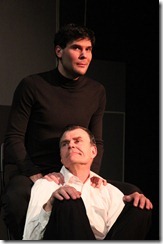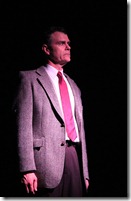With all the buzz about gender equality these days, it's difficult to recall that, over 60 years ago, homosexuals lived in fear of losing their jobs, of being arrested, of being shunned by others. In fact, they often used code words to subtly discern likeminded individuals.
One such word was "temperamentals," a slang term used by the five former Communists (and self-professed "rebels") and closeted gay men who founded the Mattachine Society in 1950, almost 20 years before the Stonewall riots put homosexuality on the front pages of the newspapers. And it is the story of this short-lived attempt to gain political, cultural and legal stature for an "oppressed sexual minority" that forms the basis of John Marans' thought-provoking docudrama, The Temperamentals, now being given a serious and sobering production by Alliance Repertory Theatre that reminds us how far we as a society have come and how arduous the trip has been for those making the journey.
The Mattachine Society, conceived by teacher, labor advocate and Communist Harry Hay in Los Angeles, took its name from a medieval secret fraternity of unmarried men who wore masks when they performed, traditionally during the Feast of Fools (the Spring Equinox, which is now), when they could criticize the powerful with impunity.
 Hay wrote the manifesto for a group that would protect and improve the lot of homosexuals and showed it to his lover, Rudi Gernreich, a Jewish refugee from the Holocaust and a budding designer with ties to famous people in Hollywood. The younger man became an enthusiastic supporter of the idea and shared it with several gay men he knew; the five organized the society according to the cell model of the Communist Party, of which several were members. When one of the men, Dale Jennings, was arrested for allegedly performing a lewd act in a men’s room, the group decided to take the case to court to address the frequent entrapment of gay men by police. Despite the spread of Mattachine Society chapters in other cities, younger members worried about the organization's left political slant, leading to the five founders to resign their leadership positions in 1953. The Mattachine Society disbanded in 1961.
Hay wrote the manifesto for a group that would protect and improve the lot of homosexuals and showed it to his lover, Rudi Gernreich, a Jewish refugee from the Holocaust and a budding designer with ties to famous people in Hollywood. The younger man became an enthusiastic supporter of the idea and shared it with several gay men he knew; the five organized the society according to the cell model of the Communist Party, of which several were members. When one of the men, Dale Jennings, was arrested for allegedly performing a lewd act in a men’s room, the group decided to take the case to court to address the frequent entrapment of gay men by police. Despite the spread of Mattachine Society chapters in other cities, younger members worried about the organization's left political slant, leading to the five founders to resign their leadership positions in 1953. The Mattachine Society disbanded in 1961.
Once again, David Christopher's firm direction leads his cast smoothly through a myriad of scene (and for some, character) changes to maintain the dramatic tension and evoke our compassion for these brave individuals. The actors include Alliance Rep veterans and a couple of newcomers, yet the group performs as an ensemble.
 James Morgan (left) is particularly fine as Harry Hay, godfather of the society. Dressed conservatively in a suit and tie, Morgan's Hay looks the least like a homosexual; in fact, the man is married and has two daughters, but he's tired of hiding his sexuality. Morgan effectively conveys the man's pain and intelligence. Dustin Ballard (at top, above) makes a spectacular Alliance Rep début as Rudi Gernreich, complete with just enough Austrian accent and effeminate body English to suggest the essence of the man without descending into caricature.
James Morgan (left) is particularly fine as Harry Hay, godfather of the society. Dressed conservatively in a suit and tie, Morgan's Hay looks the least like a homosexual; in fact, the man is married and has two daughters, but he's tired of hiding his sexuality. Morgan effectively conveys the man's pain and intelligence. Dustin Ballard (at top, above) makes a spectacular Alliance Rep début as Rudi Gernreich, complete with just enough Austrian accent and effeminate body English to suggest the essence of the man without descending into caricature.
 The other three actors assume a variety of minor roles, but really stand out as the remaining founders of the Mattachine Society. Gus Ibranyi (right) is convincing as Bob Hull, the most "out there" of the group, swanning and swishing around as though he hasn't a care in the world. Most of the humor in the play comes from his character. As former cop turned carnival worker Dale Jennings, Eddie Capuano (center) shows toughness and resilience appropriate for a person who decides to risk everything to proclaim his homosexuality in open court to make a political point. And Michael Lasry (second from right) is fine as Bob's love Chuck Rowland; he is terrific in several minor roles, such as Vincente Minnelli (closeted gay but wed to Judy Garland) and fashion designer Nigel Butler, among others.
The other three actors assume a variety of minor roles, but really stand out as the remaining founders of the Mattachine Society. Gus Ibranyi (right) is convincing as Bob Hull, the most "out there" of the group, swanning and swishing around as though he hasn't a care in the world. Most of the humor in the play comes from his character. As former cop turned carnival worker Dale Jennings, Eddie Capuano (center) shows toughness and resilience appropriate for a person who decides to risk everything to proclaim his homosexuality in open court to make a political point. And Michael Lasry (second from right) is fine as Bob's love Chuck Rowland; he is terrific in several minor roles, such as Vincente Minnelli (closeted gay but wed to Judy Garland) and fashion designer Nigel Butler, among others.
Using five chairs and swinging road signs, David Munro has designed a set that serves many locations, all of them easily identified by the audience and effortlessly changed by the actors themselves. Dori Strober has provided costumes appropriate to the characters: Hay in a rumpled suit, Gernreich outfitted in a black shirt and pants that fit his body very well, Jennings in a sweater and a cap.
In a culture where very little is private, it may be difficult for us to understand just how difficult life was for homosexuals in the 1950s. Actors like Tab Hunter and Rock Hudson lived deep in the closet, fearful of losing fans and roles. Gay men were regularly counseled to marry and father children as a cover for their real sexual natures. If young people, especially, don't seem to find the matter of gender equality a big deal, chalk it up to the brave members of the Mattachine Society; it may have been short-lived, but its effects reverberate today.
The Temperamentals will be performed by Alliance Repertory Company at the Edison Valley Playhouse, 2191 Oak Tree Road, Edison, through April 7, Fridays and Saturdays at 8 PM and Sundays at 2 PM. For information and tickets call 908.755.4654 or visit online at www.alliancerep.org.
(CRITIC’S NOTE: The opening night performance was marred by the behavior of several audience members—probably friends of the actors—who laughed loudly and inappropriately at many points in the action. In fact, I had to change my seat during intermission to avoid being disturbed. It didn’t help much. Note to performers’ friends: your loud guffaws do no service to your friends’ thoughtful performances and detracted from the mood of the play. Desist. —Ruth Ross, NJ Arts Maven)
Photos by Howard Fischer.